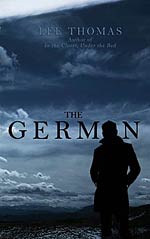
![]() charlesdee
charlesdee
9/23/2012
![]()
Ernst Lang is a middle-aged German immigrant living in a small Central Texas town during the last years of WW II. In 1933, Lang was executed in Munich during HItler's purge of those Stormtroopers whose devotion to the "socialism" of National Socialsm was proving to be a problem. Lang, after being shot three times in the chest, found himself a night later standing naked beside his grave. A resourceful and trained soldier, he got himself from Munich to New York, then New Orleans and finally to Texas. He military training and his homosexuality both help him in his escape. He finds sex partners and eventually a lover to help him. The lover, a scion of a Texas ranching family, sets him up in the small town of Barnard with a house and, after the lover's early death, an inheritance. Ernst is humiliated by this inheritance set aside for a "faithful servant." He has never been anyone's servant. Later it is revealed that his true last name is "something like Roe." Ernst Rohm was the leader of Hitler's stormtroopers, executed like Lang during the Night of the Long NIghts, Munich, 1933.
That is a complicated set up for a novel that will involve serial killings of young boys designed to turn the good people of Barnard against their German immigrant population. The novel is also a coming of age story about Tim Randall, a young boy whose father has gone missing in action in Europe. The German also exposes the ugliest depths of sadistic violence that can inform the actions of "right thinking American citizens" itching to relieve the impotent frustrations they feel as the war drags into its final years and they find themselves surrounded by American citizens tainted by their kinship with the enemy. The ignorance and violence of the population is somewhat ameliorated by the presence of Sheriff Tom Rabbit. He is an innately decent human being dedicated to the rule of law, but he also has the naivete and prejudices of his time. His experience of homosexuality does not extend beyond memories of calling boys queers on the schoolyard playground and so Lang remains a mystery to him even though he respects his rights to privacy.
The novel contains scenes of horrific violence. The child murders, though never told in detail, leave bodies that have suffered terrible indignities. Lang is tortured in ways that even his Prussian military training cannot withstand. The child Tom Randall witnesses things no child should have to endure, but one underlying theme of the novel is that children the world over witness these things on a first hand basis due either to war or totalitarian regimes with no regard for human decency.
And then there is the supernatural element. The backstory that explains Lang's deathlessness is told briefly with what is really an admirable disregard for believable detail. Something strange and violent happens in Bolivia in the early 1930's or late 1920's and years later Lang discovers that he cannot be killed and does not age. In some ways it's an odd plot element, but his inexplicable predicament gives an added dimension Lang's meditations on violence and cruelty. Lang writes this diary entry after a vicious bar fight with a visiting German who realizes he is seeing a man who should have been dead for over a decade.
The violence is still with me, and I am made peaceful by its swaddling. Few would understand my admiration for conflict. I am no sadist, nor a masochist, If anything I am absolutely sensible about it. It is man's nature. Some, like the Indian Ghandi, will extol the virtues of peace and passivity. Ridiculous. If man were a soft creature he would still crawl through the mud. No, Without struggle mankind would be no more interesting than the sunflower plant. Only through violence, rebellion, conflict was our history possible. Nietzsche wrote that. He rightly points out that deviation fuels progress. Happy people, truly content, have no cause for revolt, no motive for war, so we are created a dissatisfied and greedy species. Naturally we will be a violent species, taking what we imagine should be ours, killing for gods we imagine will one day bring us peace. These justifications for conflicts are lies -- they are imaginings like fairies and witches -- but the violence they fuel is true and honest. It is man's way. To refute this truth is to hate the self.
Is this realism or self-justification for a man whose very particular upbringing and bizarre existential predicament have brought him to such conclusions. Before the book is over, Lang will encounter ignorant brutality that makes his vision of "violence, rebellion, conflict" seem the noble construct he imagines it to be.
When it comes to its climax, the novel suffers from both some loose ends and a plot twist that would have been right at home in a 1960's episode of "Alfred Hitchcock Presents." But it is still an impressive accomplishment, that moves from Weimar Germany to Central Texas in 1940 to present-day New York City with a narrative that makes Lang's meditations on violence saddening and true.
http://www.potatoweather.blogspot.com